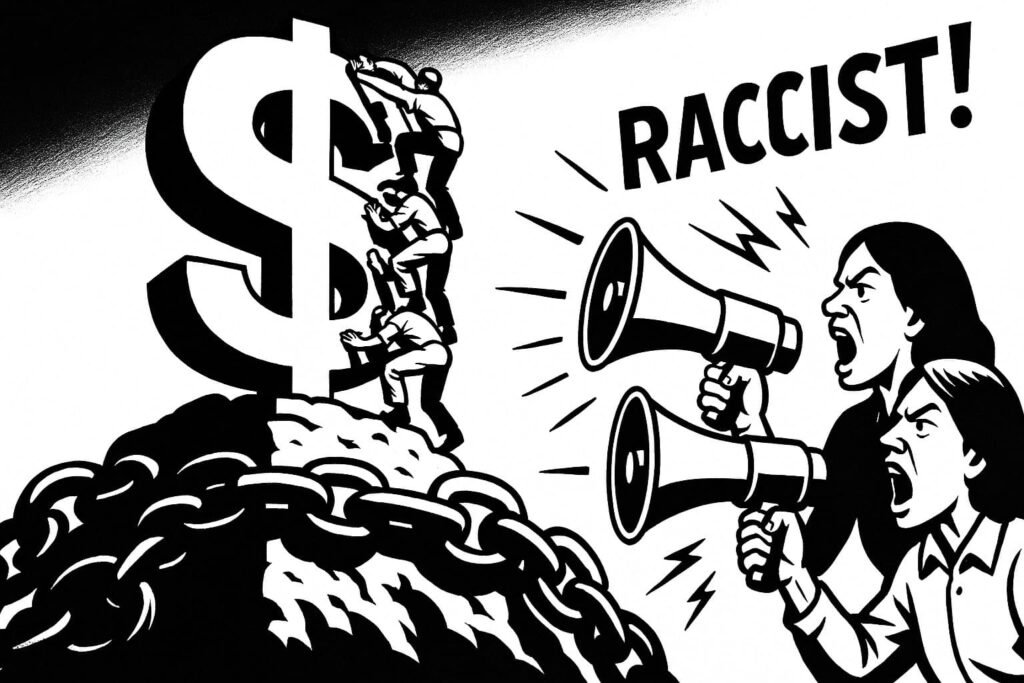Capitalism is Racist Explained – The Leftist Case for Dismantling Markets
When in doubt, blame capitalism. And if you need an upgrade, call it racist too.
For activists on the radical left, capitalism isn’t just an economic system. It’s the root of racism, inequality, and oppression. From slavery to climate change, every injustice gets traced back to markets, profit, and private property.
The conclusion? Don’t reform capitalism. Dismantle it.
Table of contents
What Is the Claim?
The argument goes like this: capitalism was built on colonialism and slavery, and therefore it cannot be separated from racial hierarchy. Modern free markets are simply polished versions of exploitation — “systemic racism” wearing a suit and tie.
For these theorists, capitalism is not colour-blind. It privileges white people and entrenches a racial wealth gap.
The Leftist Arguments
- Slavery built capitalism → Western wealth grew out of forced labour and colonial extraction, leaving minorities excluded from property and capital.
- Systemic racism in markets → housing, education, and employment structures supposedly reinforce white privilege.
- The racial wealth gap → seen as proof that capitalism benefits one group at the expense of others.
In short: capitalism is presented not as neutral rules of exchange, but as a rigged game tilted in favour of whiteness.
The Proposed Solutions
Moderate reforms? Not good enough. The radical view is abolition:
- End private property → collective ownership to prevent exclusion.
- Redistribution → reparations, heavy taxation, direct wealth transfer.
- Climate + race fusion → “climate justice” and “racial justice” tied together in anti-capitalist environmentalism.
- Decentralised governance → anarchist-style communities and mutual aid networks instead of markets and states.
Behind the slogans of justice lies the real ambition: destroy capitalism and replace it with collectivist alternatives.
Who Benefits?
- Academics & NGOs → endless research grants and programs tying every issue to racism and capitalism.
- Activists → a moral framework that justifies revolution, not reform.
- Political elites → a chance to rebrand power grabs as justice.
The Consequences
History is littered with failed experiments in dismantling markets. From the Soviet Union to Maoist China, collectivism brought poverty and repression.
But the “capitalism is racist” frame keeps resurfacing because:
- It fuses economics with identity politics.
- It makes opposition morally radioactive (who wants to “defend racism” by defending capitalism?).
- It offers activists a totalising narrative: everything unjust flows from markets.
The result is a debate less about fixing capitalism, more about whether society itself should be torn down.
Conclusion
The claim that capitalism is racist isn’t really about race — it’s about power. By branding markets as inherently oppressive, the radical left creates a moral case for revolution.
The irony? The societies that adopted these theories most aggressively didn’t end racism. They just added hunger and authoritarianism on top.
FAQ
Why do leftists say capitalism is racist?
Because they see its roots in slavery, colonialism, and systemic exclusion.
Is capitalism inherently racist?
No. Markets existed in many cultures. But the claim persists because it ties economic grievances to racial politics.
What solutions do anti-capitalists propose?
Abolishing private property, wealth redistribution, reparations, and collectivist governance.
What’s the danger of framing capitalism as racist?
It turns economic debate into a moral war, making reform impossible and revolution inevitable.
Has dismantling capitalism worked anywhere?
Historically, no. It has usually produced economic collapse and political repression.



